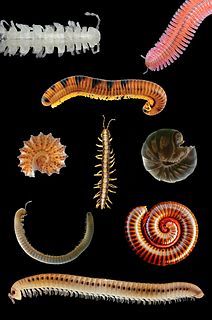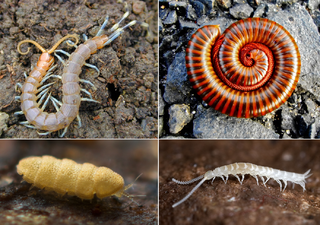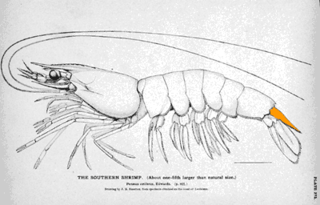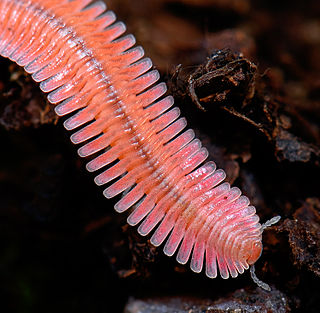
Millipedes are a group of arthropods that are characterised by having two pairs of jointed legs on most body segments; they are known scientifically as the class Diplopoda, the name derived from this feature. Each double-legged segment is a result of two single segments fused together. Most millipedes have very elongated cylindrical or flattened bodies with more than 20 segments, while pill millipedes are shorter and can roll into a ball. Although the name "millipede" derives from the Latin for "thousand feet", no known species has 1,000; the record of 750 legs belongs to Illacme plenipes. There are approximately 12,000 named species classified into 16 orders and around 140 families, making Diplopoda the largest class of myriapods, an arthropod group which also includes centipedes and other multi-legged creatures.

Millipede is a fixed shooter video game released in arcades by Atari, Inc. in 1982. The sequel to 1981's Centipede, it has more gameplay variety and a wider array of insects than the original. The objective is to score as many points as possible by destroying all segments of the millipede as it moves toward the bottom of the screen, as well as eliminating or avoiding other enemies. The game is played with a trackball and a single fire button which can be held down for rapid-fire.

Centipedes are predatory arthropods belonging to the class Chilopoda of the subphylum Myriapoda, an arthropod group which also includes millipedes and other multi-legged creatures. Centipedes are elongated metameric creatures with one pair of legs per body segment. Most centipedes are venomous and can inflict painful bites, injecting their venom through pincer-like appendages known as forcipules. Despite the name, centipedes can have a varying number of legs, ranging from 30 to 354. Centipedes always have an odd number of pairs of legs. Therefore, no centipede has exactly 100 legs. Like spiders and scorpions, centipedes are predominantly carnivorous.

Centipede is a 1981 fixed shooter arcade game developed and published by Atari, Inc. Designed by Dona Bailey and Ed Logg, it was one of the most commercially successful games from the golden age of arcade video games and one of the first with a significant female player base. The primary objective is to shoot all the segments of a centipede that winds down the playing field. An arcade sequel, Millipede, followed in 1982.

George Edward "Ed" Logg is a retired American arcade video game designer, first employed at Atari, Inc. and later at Atari Games. He currently resides in Los Altos, California.

Myriapoda is a subphylum of arthropods containing millipedes, centipedes, and others. The group contains over 16,000 species, most of which are terrestrial.

The telson is the posterior-most division of the body of an arthropod. Depending on the definition, the telson is either considered to be the final segment of the arthropod body, or an additional division that is not a true segment on account of not arising in the embryo from teloblast areas as other segments. It never carries any appendages, but a forked "tail" called the caudal furca may be present. The shape and composition of the telson differs between arthropod groups.
A centipede is an arthropod belonging to the class Chilopoda.

Atari - 80 Classic Games in One!, also called Atari: The 80 Classic Games, is a video game collection of 1980 video games previously published by Atari, Inc. and Atari Corporation, reproducing Atari's games from its arcade and Atari 2600 game console platforms. Many games permit one to play each title at varying speeds, with time limits, or with a shifting color palette.

Spirostreptida is an order of long, cylindrical millipedes. There are approximately 1000 described species, making Spirostreptida the second largest order of millipedes after Polydesmida.
A number of different centipede species in the family Scutigeridae are known as the house centipede, including:

A centipede bite is an injury resulting from the action of a centipede's forcipules, stinger-like appendages that pierce the skin and inject venom into the wound. Such a wound is not strictly speaking a bite, as the forcipules are a modified first pair of legs rather than true mouthparts. Clinically, the wound is viewed as a cutaneous condition characterized by paired hemorrhagic marks that form a chevron shape caused by the paired forcipules.

Millipede burns are a cutaneous condition caused by some millipedes that secrete a toxic liquid that causes a brownish pigmentation or burn when it comes into contact with the skin. Some millipedes produce quinones in their defensive secretions, which have been reported to cause brown staining of the skin.

Julida is an order of millipedes. Members are mostly small and cylindrical, typically ranging from 10–120 millimetres (0.39–4.72 in) in length. Eyes may be present or absent, and in mature males of many species, the first pair of legs is modified into hook-like structures. Additionally, both pairs of legs on the 7th body segment of males are modified into gonopods.

Platydesmida is an order of millipedes containing two families and over 60 species. Some species practice paternal care, in which males guard the eggs.

Robert Latzel was an Austrian myriapodologist and entomologist who published a series of pioneering works on millipedes, centipedes, and allies. His collection of myriapod specimens, today housed in the Natural History Museum of Vienna, includes many type specimens. His monographs on the myriapods of the Austro-Hungarian Empire were the first comprehensive treatments of the large region's centipede and millipede faunas. He named nearly 130 taxa of millipedes and over 40 centipede groups, as well as four taxa each of pauropods and symphylans. His work on millipedes pioneered the use of gonopods in millipede classification and species recognition. At least three authors have honored Latzel by naming a genus Latzelia.
Euphoberia armigera is a species of myriapod that lived until the Pennsylvanian epoch 332–318 million years ago. Many sources differentiate on its size and whether it is a millipede, centipede or even new class of myriapod.
Arcade Classic is a series of five compilations of arcade games for Game Boy released in 1995. The first four were published by Nintendo, while the fifth was developed and published by Black Pearl Software. Each cartridge includes two games.













